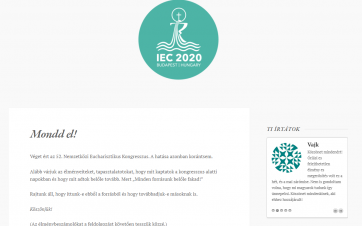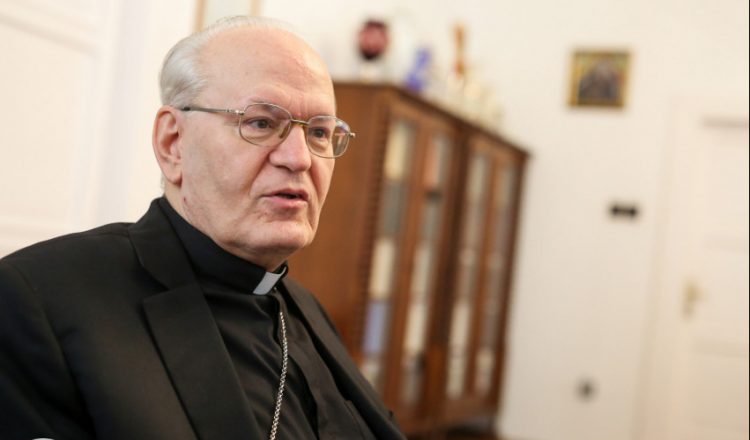
A supplication for life and renewal

The 52nd International Eucharistic Congress is going to take place between 13 and 20 September this year, in Budapest. We talked about the preparations and the experiences gained so far with the host of the Catholic world event, Primate Cardinal Peter Erdő.
- It seemed to be far away a couple of years ago, but now we have arrived to the year of the IEC. The venues have been chosen and booked. How do you feel about the preparations and what programme of events are going to help the attendants during the IEC week in September?
- I believe it is similar to Advent. Everything has to be born in our souls while waiting for something big depends on several factors. There are external factors on the one hand – when will the venues be ready, how many people will register. We have to deal with catering and security issues, stage techniques, the operation of sound and lighting. However, on the other hand, we have to prepare our souls to the event, which is equally diverse.
Firstly, we have to speak about the prayers being said for the Eucharistic congress in numerous languages. Eucharistic adoration, to which a number of churches have joined, is also of utmost importance. Training sessions in Eucharistic adoration have been launched in order to avoid undesirable extremities. Some say that the more we speak during adoration, the better. Others mix adoration up with oriental meditation without talking and thinking. We have to find a healthy balance, as we are human beings. God cannot be restricted.
An international adoration is interesting because a huge crowd joins in at the same time. With global communication the whole human race is able to share an elevated thought – as we saw at the funeral of Pope John Paul II.
People are comprised of body and soul. By incarnation God wants to talk to us as a human being, so we have to pay attention to the internal and external factors at the same time. Our everyday life will not work if we pay attention only to one of them. We need balance. The IEC shares the competencies between different committees in order to make the organisation smooth and efficient. A number of various governmental and non-governmental organisations take part in the preparatory works from religious movements to the Ministry of Interior of Hungary.
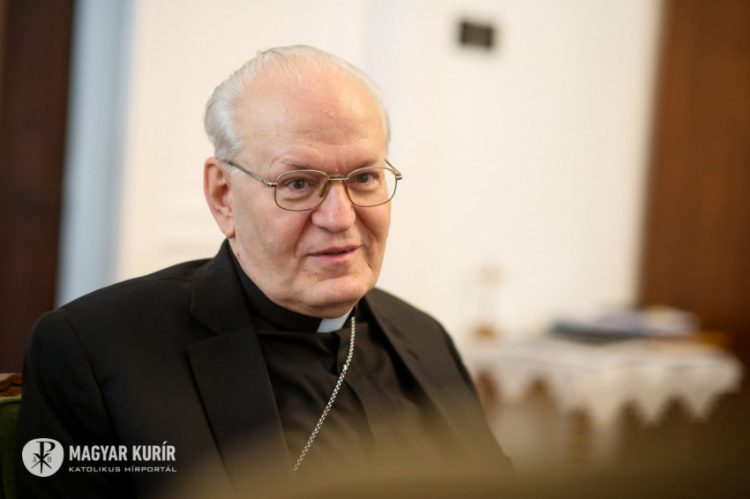
- What events contribute to the preparation before the event?
- There will be a large amount. Amongst them, a conference on worldwide charitable activities is going to be chaired by the president of International Confederation of Catholic Organizations for Charitable and Social Action, Cardinal Luis Antonio Gokim Tagle. A scientific conference on Eucharistic theology is also going to take place in the beginning of September, 2020, in Esztergom, with special regard to biblical and pastoral aspects. The presenter from the Ecumenical Council of Churches in Hungary is going to speak about the role of the communion in the different member churches. On the Saturday before the opening we invite our brothers and sisters in need to join an agape feast in Budapest and in several other cities. In the opening mass at Puskás Arena more than 3500 registered people will receive their first holy communion. The opening mass is going to be the central mass for the opening of the school year in the Archdiocese of Esztergom-Budapest. During the IEC, there will be various morning events at the Hungexpo, for example, testimonies, prayers and scripture studies, but we can hear about the experiences of the victims of Christian persecution. In the afternoons, fellow believers are going to speak about their charismatic, social our charitable activities. Father Csaba Böjte, the Actio Catholica and the Hetvenkét Tanítvány Mozgalom (Movement of the Seventy-two Disciples) will also join in the programme of events. On Thursday a Gypsy mass will be celebrated, the music of which has already been composed and the order of mass is waiting for approval.
A number of further events are expected. On Monday the Csík Band gives a concert and on Tuesday a train trip will be organised to Esztergom, to give thanks for the existence of the Order of Saint Paul the First Hermit, together with the Pauline Fathers Prior General. I would like to highlight the meeting of Eastern Catholic bishops and the Byzantine order mass with the participation of almost fifty bishops and the main celebrant of which will be the Melkite Patriarch. One afternoon we will be able to hear the choir of the Moscow Patriarchate and on another date we can enjoy the performance of the Budapest Gypsy Orchestra. Friday afternoon is for the youth with a concert by Ákos and with the Forráspont day. Saturday morning we will be inviting the families to Margaret Island for a family day and in the afternoon we await the believers for mass and the torchlight Eucharistic procession at Kossuth Square. The closing mass is going to take place on Sunday at Hősök tere (Heroes’ Square).
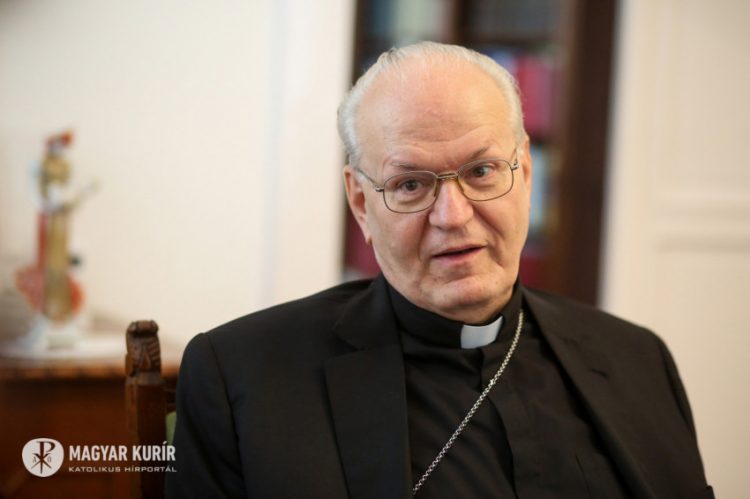
- Our readers received the registration forms together with our Christmas issue. Why is it important to register six months in advance?
- Registration has been launched both in paper and in online form. We aimed to require as little data as possible. In case of our events the registration means the booking of seats as well, so that it is worth to register in time.
- International is added to the title of the Eucharistic congress. What does “international” mean here?
- The universal church has different degrees of congresses, like diocesan, national or international Eucharistic congresses. Participants are invited and expected from all over the world for the international congresses. In the early Christian Church there was only one community for one town, and the church attended for hearing the mass was called a station. Since the second Vatican Council, it has been emphasized that the closing mass of the international Eucharistic congresses is a “Statio Orbis” mass, as it is offered in the name of the whole world.
- The 1938 Budapest congress was attended by a huge amount of people. What has changed since then?
- First of all, the rhythm of life that has changed a lot. There were sights to see in Budapest in 1938, but the city was not as multicultural as it is nowadays. Infrastructure and public transport have improved a lot since then. In that time people went on foot for longer distances. In 2020, we have tried to adjust the event to the attitude of the people of the twenty-first century. For example, participants can use Budapest travel passes on public transport very conveniently.
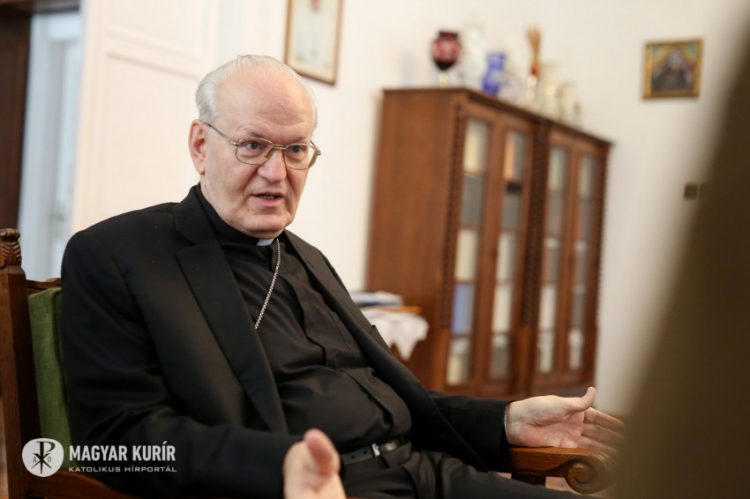
- Is this congress a demonstration of power or an opportunity to the internal renewal of the Hungarian Catholic Church?
- It is a supplication for life and renewal. The Congress itself is not the renewal, but the starting point of a process. We started a movement for the renewal of parochial life, where we discuss with the priests and the representatives of the parishes what a parish should be to fulfil its mission. As part of the renewal process, the Hungarian Catholic Bishops’ Conference decided to renew the church songbook, to refresh the Hungarian religious music. It is important to include more on preaching in the training of the clergy in order to enhance the transmission of the message.
- What is the target group of the Eucharistic Congress?
- As we go out to public places, everybody is part of the target group, but certain parts of the event are addressed to Catholic Christians.
- On Gaudete Sunday, after the Angelus, Pope Francis asked for prayers for the IEC 2020. Why is this request important? How can we respond to it best?
- As the Congress was proclaimed and its venue was selected by the Holy Father, we can be sure that he is concerned about it. Pope Francis knows it well that besides good organisation the mercy of God plays a significant role in the spiritual effect of the Congress, so prayers are very important. It was interesting how Pope Francis connected the nativity scene to the Eucharist. The nativity scene drives our attention to the incarnation of God, while the Eucharist means that He remained among us. God entered into a special union with us, which we cannot comprehend.
- At the end of the mass we pray for the Congress and for the renewal of the world and Europe. What do you think of the hope of Europe and of the world?
- Our hope is in our God. We firmly believe that we are not just drifters. We have to face controversial challenges day by day. The globalisation of the economy, the telecommunication and culture allows us to know more and more of each other. But it is not enough. We have to take care of each other. We have to get to know other nations and communities, especially within the European Union. If we appreciate foreign cultures and experiences then we will be able to appreciate ourselves too. I have just returned from Madrid, where I spoke about the phenomenon of nation and nationalism before the representatives of the Spanish Catholic Bishops’ Conference and the Catholic universities. They asked me because they were interested in Middle-European experiences and because I had been the President of the Council of the Bishops' Conferences of Europe for a longer period. I spoke without embarrassment about some issues which were totally unknown for some participants. Different historical experiences of different nations can help us to solve our problems. We have to see the theological perspective in these questions as well. God extended his love to the whole human race. It is written in the Holy Bible that God takes care of the nations, the Gospel was preached to various nations and on the last day all nations would be convened.
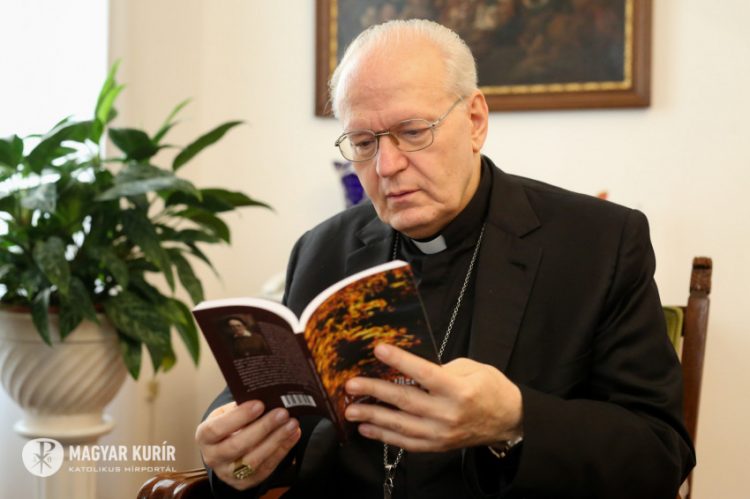
- The congress is advertised beyond the borders of Hungary by the mission cross. Why was this cross chosen for this mission and why does it not contain the relics only of Hungarian saints?
- The cross is the symbol of the mission, and this was the mission cross for the City Mission in 2007. The cross of Christ is the symbol of resurrection, salvation and hope. So that, each and every Christian is in contact with the cross. If we look at our saints we see that we have to follow Christ in every situation in our lives. But it is not that far away from us, as anybody can become a saint. And to answer why the relics of saints, who were not Hungarian are included in this cross is because every martyr who died for Christ in the Carpathian Basin is connected to us. The relic of a saint like Pope Innocent XI, who did a lot for the Hungarian Catholic Church and without whom, we could not even talk about Hungarian Christianity, does undoubtedly fit in the cross. Maybe the martyr of a neighbouring country did not speak Hungarian, but they either attended the Central Seminaries of Budapest or their faithful were Hungarian.
- How would you encourage our readers?
- Let’s pray for the International Eucharistic Congress and seek our own opportunities to add to its success. I wish strength and mercy for these to the readers.
Photo: Zita Merényi
Source: István Kuzmányi /Magyar Kurír
The printed version of this interview is published in the 5 January, 2020 issue of the Új Ember.




